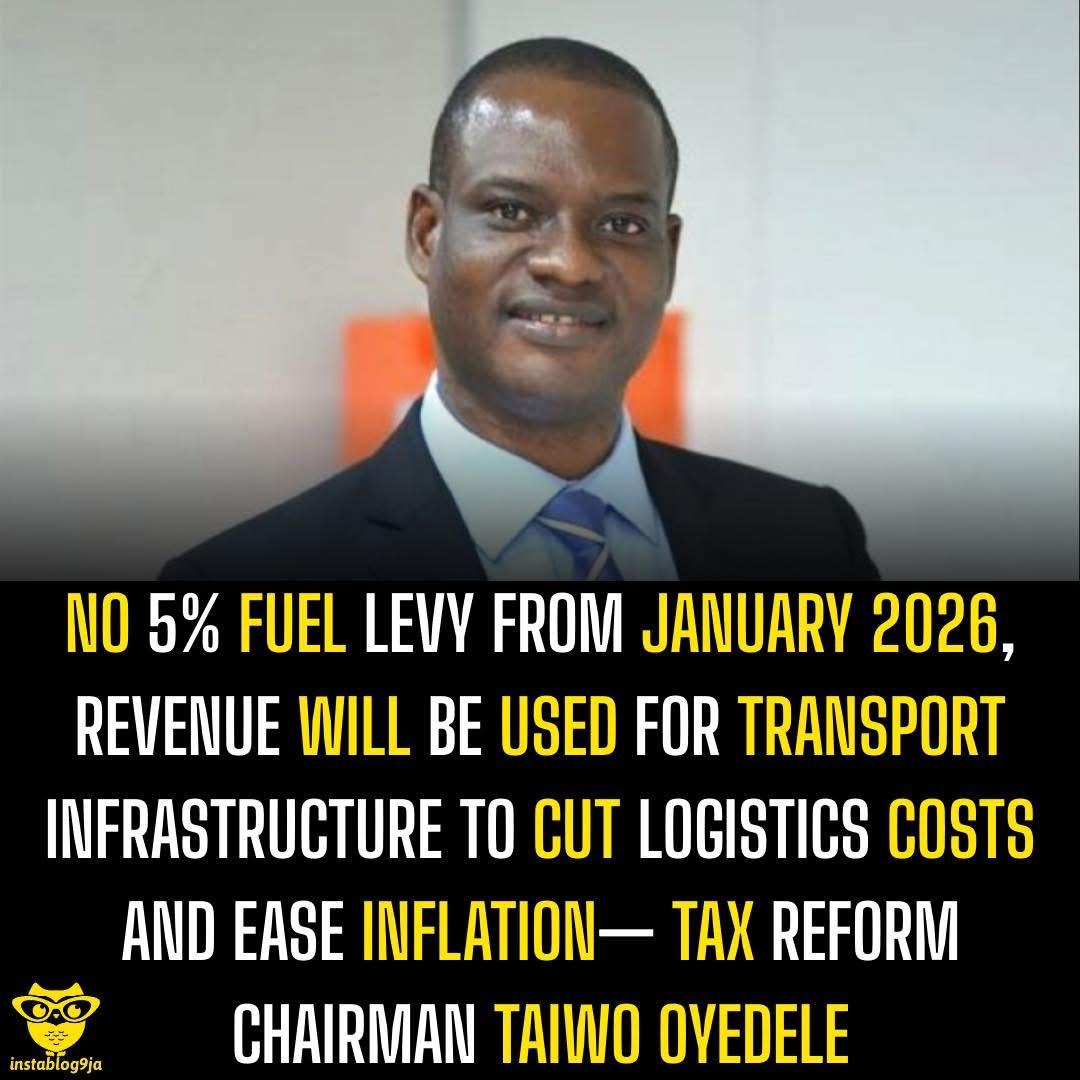No 5% Fuel Levy From January 2026, Revenue Will be Used for Transport Infrastructure to Cut Logistics Costs and Ease Inflation— Tax Reform Chairman Taiwo Oyedele
Chairman of the Presidential Tax Reform Committee, Taiwo Oyedele, has clarified that the proposed five per cent fuel surcharge will not take effect in January 2026, insisting that its implementation remains subject to a formal commencement order by the Minister of Finance.
In a video released by the State House on Friday, Oyedele dismissed as “false and misleading” reports that Nigerians would begin paying the levy next year under the newly signed Tax Administration Act.
“What we have is a provision carried over into the new tax law, but it does not automatically commence in January 2026,” Oyedele explained. “The date will only be set through an official order by the Minister of Finance.”
He explained that the surcharge is intended to fund transport infrastructure, which would in turn reduce logistics costs, ease commuting, and help bring down inflation.
The clarification comes amid growing public concern that new fuel-related taxes could worsen economic hardship under President Bola Tinubu’s administration.
The levy, contained in the Nigeria Tax Administration Act signed into law on June 26, 2025, applies to every supply or sale of refined fossil fuel products in the country, whether produced locally or imported. However, cleaner alternatives such as renewables, household kerosene, cooking gas (LPG), and compressed natural gas (CNG) are exempt.
Chairman of the Presidential Tax Reform Committee, Taiwo Oyedele, has clarified that the proposed five per cent fuel surcharge will not take effect in January 2026, insisting that its implementation remains subject to a formal commencement order by the Minister of Finance.
In a video released by the State House on Friday, Oyedele dismissed as “false and misleading” reports that Nigerians would begin paying the levy next year under the newly signed Tax Administration Act.
“What we have is a provision carried over into the new tax law, but it does not automatically commence in January 2026,” Oyedele explained. “The date will only be set through an official order by the Minister of Finance.”
He explained that the surcharge is intended to fund transport infrastructure, which would in turn reduce logistics costs, ease commuting, and help bring down inflation.
The clarification comes amid growing public concern that new fuel-related taxes could worsen economic hardship under President Bola Tinubu’s administration.
The levy, contained in the Nigeria Tax Administration Act signed into law on June 26, 2025, applies to every supply or sale of refined fossil fuel products in the country, whether produced locally or imported. However, cleaner alternatives such as renewables, household kerosene, cooking gas (LPG), and compressed natural gas (CNG) are exempt.
No 5% Fuel Levy From January 2026, Revenue Will be Used for Transport Infrastructure to Cut Logistics Costs and Ease Inflation— Tax Reform Chairman Taiwo Oyedele
Chairman of the Presidential Tax Reform Committee, Taiwo Oyedele, has clarified that the proposed five per cent fuel surcharge will not take effect in January 2026, insisting that its implementation remains subject to a formal commencement order by the Minister of Finance.
In a video released by the State House on Friday, Oyedele dismissed as “false and misleading” reports that Nigerians would begin paying the levy next year under the newly signed Tax Administration Act.
“What we have is a provision carried over into the new tax law, but it does not automatically commence in January 2026,” Oyedele explained. “The date will only be set through an official order by the Minister of Finance.”
He explained that the surcharge is intended to fund transport infrastructure, which would in turn reduce logistics costs, ease commuting, and help bring down inflation.
The clarification comes amid growing public concern that new fuel-related taxes could worsen economic hardship under President Bola Tinubu’s administration.
The levy, contained in the Nigeria Tax Administration Act signed into law on June 26, 2025, applies to every supply or sale of refined fossil fuel products in the country, whether produced locally or imported. However, cleaner alternatives such as renewables, household kerosene, cooking gas (LPG), and compressed natural gas (CNG) are exempt.





